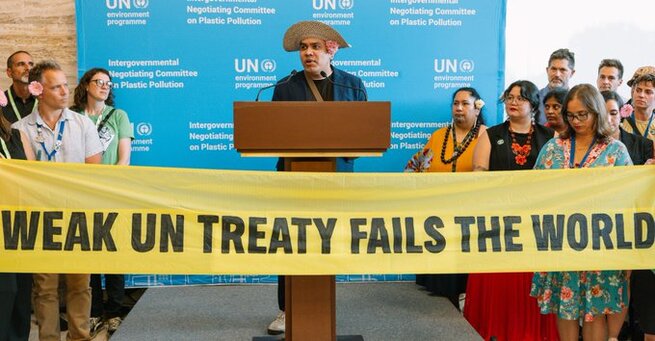
Global Plastic Pollution Treaty Delayed — Why That Could Be Good News
The push for a global plastic pollution treaty has been years in the making, with nations gathering in Geneva this month in hopes of reaching a final agreement. Delegates from 184 countries debated how to curb plastic waste, but talks ended without a deal. While some see this as a setback, environmental advocates argue that no deal is better than a weak one. The sticking point? Whether the treaty should include limits on plastic production and a phase-out of hazardous chemicals — measures opposed by nations where plastics and fossil fuels dominate the economy.
Why no deal can be better than a weak treaty on plastic pollution
Rushing into an agreement without strong, enforceable measures risks creating a treaty that does little to protect people or the planet. Advocates stress that plastic production, not just waste, must be addressed. Countries like the US and Russia prefer focusing on recycling and waste management, but critics warn that this ignores the root of the problem. “We’re not here to simply get to a deal. We are here to end plastic pollution,” said Juan Carlos Monterrey Gómez, Panama’s Special Representative for Climate Change.
The growing threat of unchecked plastic production
Plastic production has soared since the 1950s, hitting 475 million metric tons annually by 2022. These plastics often contain more than 16,000 chemicals, many of which can leach into the environment, the air, and even human bodies. Scientists and health experts are urging a stronger treaty that directly reduces production and eliminates hazardous substances. Without these steps, recycling alone cannot keep pace with the environmental and health impacts.
What’s next for the global plastic pollution treaty
Although the missed deadline delays progress, it also gives negotiators more time to craft a comprehensive, enforceable agreement. The goal remains to create a legally binding treaty that addresses the full life cycle of plastics — from production to disposal — and safeguards both ecosystems and public health. This pause could be the opportunity the world needs to ensure that when a deal is signed, it’s strong enough to make a lasting difference in the fight against plastic pollution.
𝗦𝗲𝗺𝗮𝘀𝗼𝗰𝗶𝗮𝗹 𝗶𝘀 𝘄𝗵𝗲𝗿𝗲 𝗿𝗲𝗮𝗹 𝗽𝗲𝗼𝗽𝗹𝗲 𝗰𝗼𝗻𝗻𝗲𝗰𝘁, 𝗴𝗿𝗼𝘄, 𝗮𝗻𝗱 𝗯𝗲𝗹𝗼𝗻𝗴. We’re more than just a social platform — from jobs and blogs to events and daily chats, we bring people and ideas together in one simple, meaningful space.